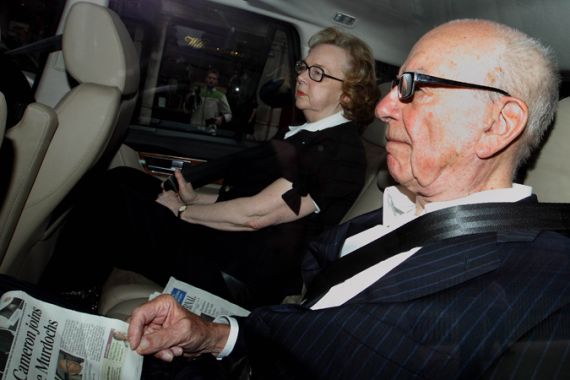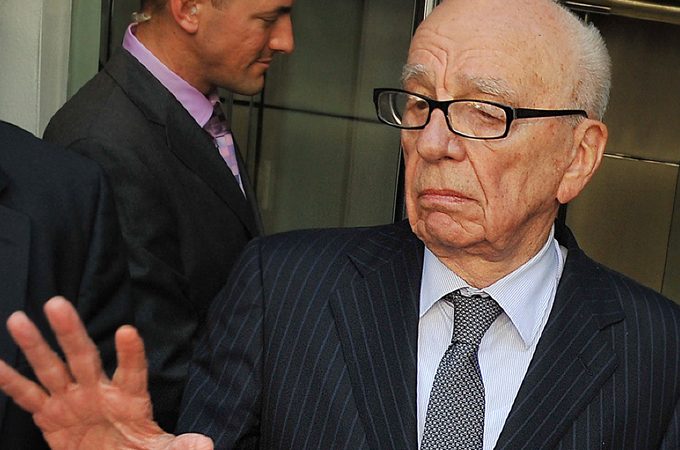Murdoch’s Austar bid likely to be blocked
Australian competition regulator expected to reject Foxtel’s attempted acquisition of rival pay-TV business Austar.

 |
| News Corp chief Rupert Murdoch issued a public apology for News of the World‘s phone-hacking scandal [AFP] |
In a further blow to Rupert Murdoch, a $2bn takeover bid by an Australian pay-TV business part-owned by his News Corp is expected to be blocked by Australia’s competition watchdog.
The bid for rival Austar by Foxtel, in which News Corp has a 25 per cent stake, would create a pay-TV monopoly, the Australian Competition and Consumer Commission (ACCC) said on Friday.
Keep reading
list of 4 itemsWhy are nations racing to buy weapons?
Parallel economy: How Russia is defying the West’s boycott
US House approves aid package worth billions for Ukraine, Israel
The commission said its preliminary finding had nothing to do with the phone-hacking scandal engulfing News Corp in Britain, which prompted Murdoch to abandon a separate pay-TV deal to take over British firm BSkyB.
“It has nothing to do with it all, not even a consideration,” Graeme Samuel, the commission’s chairman, said.
Analysts warned that the commission’s final decision, due in September, was likely to reflect its preliminary views, thus killing the deal.
“It is hard to see what kind of remedies Foxtel and Austar can provide to alleviate the concerns of the ACCC, without undermining the value of the deal,” Justin Diddams, an analyst at Citi Bank, said.
Murdoch’s major shareholder partners in Foxtel include telecoms firm Telstra and billionaire James Packer’s Consolidated Media Holdings.
Foxtel launched a bid in May to buy Austar, which is majority-owned by Liberty Global.
The deal is small for News Corp, a media group that reported third-quarter net income of $639m and revenues of $8.26bn.
Austar shares had slipped earlier in the week on concerns the fallout from the phone-hacking scandal that has undermined confidence in Britain’s media, its politicians and the police may affect Foxtel’s bid because News Corp was a major shareholder.
Austar shares slumped as much as 20 per cent after the commission’s comments, wiping $358m off its market value.
The shares closed down 16 per cent lower compared to Foxtel’s original share bid.
Even though the Austar deal may be closed off to Foxtel, the Australian government has decided to reopen a bitterly fought tender involving Murdoch’s part-owned Sky News for the country’s taxpayer-funded overseas TV service.
Competing bids
The Austar deal, finalised after years of talks, would have marked the latest shake-up for Australia’s media sector as the pay-TV operator sought to revive flagging subscriptions and take on the nation’s free-to-air television stations.
“It does open the door for a competing bid, if anyone out there was thinking of getting into the Australia market, with Foxtel’s hands now tied,” a fund manager, who declined to be named, said.
He pointed to telecoms firm Optus, owned by Singapore Telecommunications, and iiNet as potential suitors.
Both Austar and Foxtel said they would work with the competition regulator to try to save the bid, which would create one of Australia’s largest media businesses with more than 2,500 employees and anticipated revenue of more than $2.8bn.
“Competition in this market will only further increase in the future with developments in technology and the rollout of the [National Broadband Network],” Kim Williams, Foxtel chief executive, said.
The ACCC said the Foxtel-Austar deal could substantially lessen competition in subscription TV services, acquisition of audio visual content and competition in telecommunications products.
The watchdog expects to complete market inquiries by August 11 and make a final decision on the deal on September 8.
Murdoch’s News Corp empire has come under enormous pressure in the wake of revelations that journalists at one of its British newspapers paid bribes to police and hacked the phones of thousands of people including celebrities, war widows and victims of crimes.
Investigations are underway in Britain and the United States.
Australia is looking at strengthening privacy laws because of public concern over media intrusion in the wake of the phone-hacking scandal.